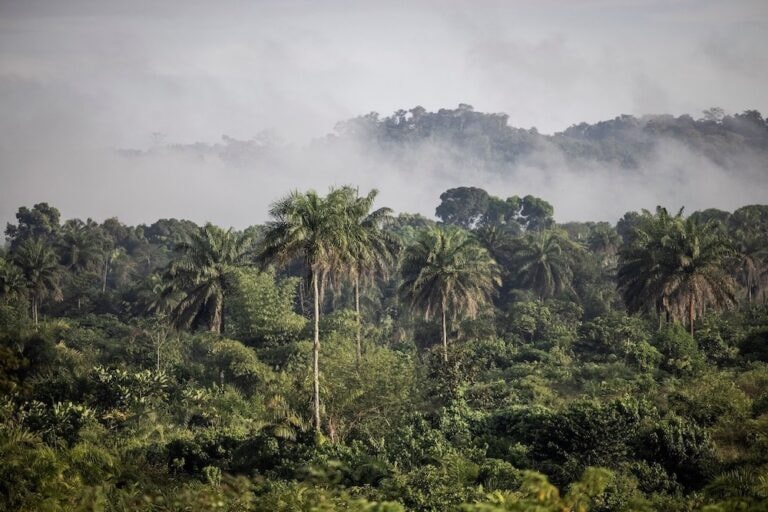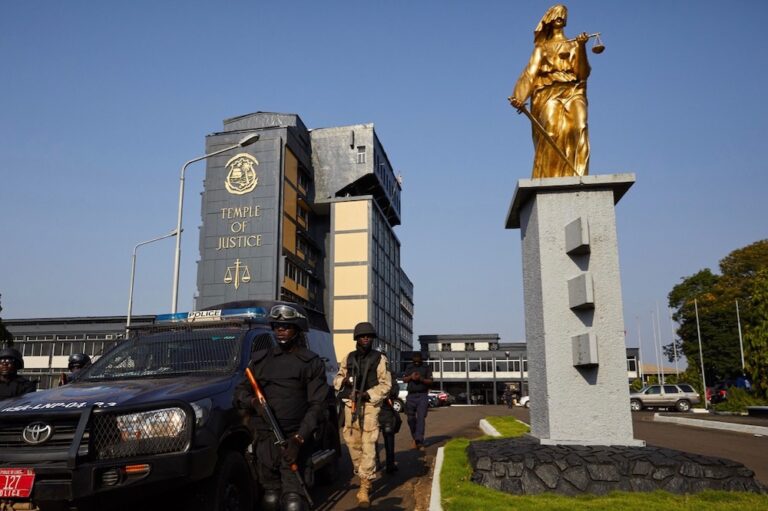Liberian journalist Nyenati Allison, correspondent for the Associated Press (AP) news agency and the British Broadcasting Corporation’s (BBC) “Focus on Africa”, was targeted by both sides of the recent factional fighting in the Liberian capital, Monrovia. On 7 April 1996, one day after fighting erupted, Allison was chased into hiding by a group of fighters […]
Liberian journalist Nyenati Allison, correspondent for the
Associated Press (AP) news agency and the British Broadcasting
Corporation’s (BBC) “Focus on Africa”, was targeted by both sides
of the recent factional fighting in the Liberian capital,
Monrovia.
On 7 April 1996, one day after fighting erupted, Allison was
chased into hiding by a group of fighters loyal to Roosevelt
Johnson’s United Liberation Movement (ULIMO), who accused Allison
of reporting lies during the standoff. Allison fled to safety in
the United Nations (UN) compound for two nights, during which
time fighters returned, circling the grounds and firing their
guns. On 9 April, Allison, dressed in disguise, left the UN
compound, as his presence was putting at risk the lives of other
people also seeking refuge there. He stayed at the headquarters
of the West African peacekeeping force (ECOMOG) until the evening
of 10 April, when he felt certain that the fighters had forgotten
about him. Allison subsequently returned to work on 11 April,
covering the battles in Monrovia. However, on 19 April, Allison
was picked up by soldiers loyal to Charles Taylor’s National
Patriotic Front of Liberia (NPFL). The fighters defended their
actions by citing Allison’s recent critical reports on fighting
outside Monrovia waged by the NPFL near a ULIMO stronghold.
Allison was released on 21 April and was reported to be in good
health.
Allison was one of three Liberian journalists who was offered
assistance in leaving the country during United States-led
evacuations. Reuters correspondent Jackson Konneh and BBC Network
Africa stringer Budu Kaisa were airlifted out of the country
early in the conflict, while Allison stayed behind.
Meanwhile, the offices of Liberia’s seven newspapers and two
printing presses, all located in the centre of Monrovia, were
reportedly not spared in the massive looting by armed fighters.
The radio station, ELCM, which is operated by the National
Catholic Secretariat, was torched in the early days of the
standoff. None of the station’s journalists were reportedly
injured. As well, the offices of the Press Union of Liberia (PUL)
were also looted, leaving the premises riddled with bullet holes
and littered with shell casings.
While the almost 20 international correspondents covering the
strife in Monrovia are accompanied by NPFL, ECOMOG and United
States soldiers during their rounds in the war-ravaged capital,
local reporting of the conflict has come to a complete halt, with
reporters for local newspapers and most radio stations, like
other Liberian civilians, having to seek refuge. Nevertheless, a
few radio stations have been able to operate. The Liberia
Broadcasting System (LBS) resumed operations on 20 April, and is
apparently transmitting intermittently from a secret location.
ELWA-FM, run by the Sudan Industrial Mission (SIM), a religious
broadcasting service, is currently transmitting Christian
programming consisting of music and sermons. KISS-FM, operated by
the NPFL, is also transmitting. However, there have been reports
that threats to individuals, hate-mongering rhetoric and
incitements of violence have been broadcast by KISS-FM.


